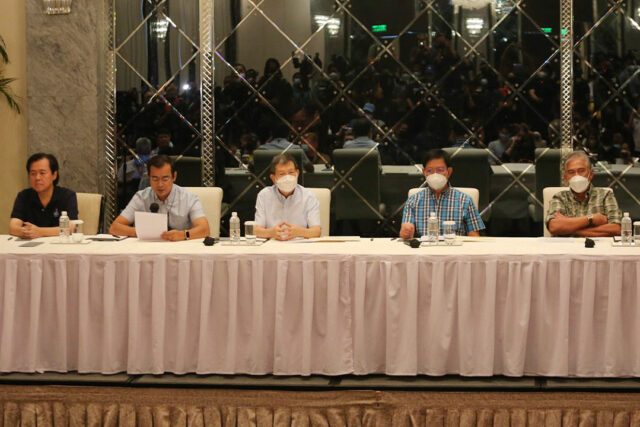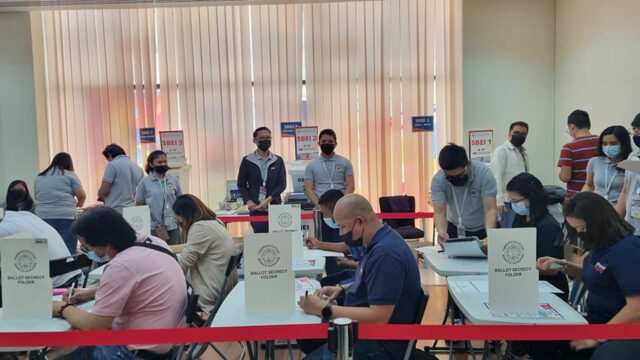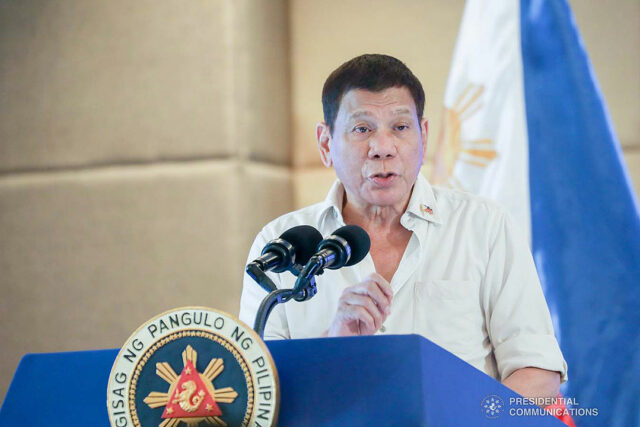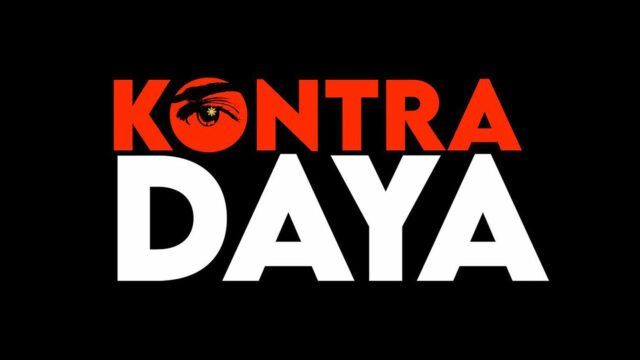Philippines most ‘internet poor’ in Southeast Asia
More than half of the Philippine population are considered “internet poor” — or those who cannot afford a minimum package of mobile internet — according to the Internet Poverty Index by Austria-based data enterprise World Data Lab. Among 169 countries included in the index, the Philippines ranked 38th in terms of internet poor as share of the population. This translated to over 58 million Filipinos who cannot afford a 1-GB-per-month internet package. This put the country the seventh in the world with the largest number of internet poor.
Presidential laggards vow they won’t quit race
By Kyle Aristophere T. Atienza, Reporter
THREE presidential candidates on Sunday vowed not to drop out of the race, amid calls by some sectors for them to back Vice-President Maria Leonor “Leni” G. Robredo and prevent another Marcos presidency.
“We will never let go of our campaigns,” Manila Mayor Francisco “Isko” M. Domagoso, who is a distant No. 3 in presidential opinion polls, said at a hastily called news briefing in Filipino. “Each of us will continue with our own candidacies to deserve being chosen by the Filipino nation.”
He was joined by Senator Panfilo “Ping” M. Lacson and former National Security Adviser Norberto Gonzales, who are also trailing in most opinion polls. Mr. Domagoso said Mr. Pacquiao, who was absent on Sunday, had also supported the statement.
The presidential bets focused too much on Ms. Robredo instead of former Senator Ferdinand “Bongbong” R. Marcos, Jr., who is leading in presidential opinion polls, said Jean Encinas-Franco, who teaches political science at the University of the Philippines (UP).
“If you want to win, why are you hitting the No. 2 and not the No. 1 when there are more reasons to hit the latter?” she said in a Facebook Messenger chat.
Mr. Marcos kept his lead in Pulse Asia Research, Inc.’s presidential opinion poll last month, with 56% of Filipinos saying they would vote for him, even if his rating fell by 4 points.
Still in second place was Ms. Robredo, whose rating rose by 9 points to 24%. She was followed by Mr. Domagoso (8%), Senator and boxing champion Emmanuel “Manny” D. Pacquiao (6%), Mr. Lacson (2%), businessman Faisal Mangondato (1%), former Cabinet official Ernesto C. Abella (0.1%), cardiologist Jose C. Montemayor, Jr. (0.05%) and labor leader Leodegario “Ka Leody” de Guzman (0.02%).
Mr. Gonzales got zero.
It’s every candidate’s prerogative to continue until the end and ignore opinion polls and endorsements, Ibarra M. Gutierrez III, Ms. Robredo’s spokesman, said in an e-mailed statement.
“But in making these choices, should we not ask ourselves: Must this assertion be made through bluster and falsehood? Who benefits from such theatrics?” he asked.
“Perhaps, silence would have had more depth; at the very least, it would exhibit less self-entitlement, fragility and toxicity.”
“We are thankful that the alignments have been made even clearer. And we remain focused on showing our people that a Robredo presidency will mean a victory for all Filipinos,” he added.
At Sunday’s briefing, the three candidates accused Ms. Robredo’s camp of negative campaigning. “Let’s stop the quarrel between the reds and yellows,” Mr. Domagoso said, alluding to the camps of Mr. Marcos and Ms. Robredo, respectively. The two other candidates also attacked the opposition camp.
Mr. Domagoso, who has presented himself as an alternative candidate, called the vice-president’s supporters “yellow,” a derogatory term used against the political supporters of the late President Benigno S.C. Aquino III.
His mother, the late President Corazon C. Aquino, led a popular street uprising that toppled the regime of the late dictator Ferdinand E. Marcos — Bongbong’s father — and forced him and his family into exile in the United States in 1986. Ms. Robredo is not a member of the Aquino clan.
Mr. Domagoso and Mr. Lacson also lamented how they were being forced to withdraw from the race, and the fact that they have lost some supporters.
The issues raised by the candidates were “nothing new,” said Maria Ela L. Atienza, who also teaches political science at the UP. “A press release signed by all of them would have sufficed,” she said in a Viber message.
She noted that instead of raising attention to reported anomalies in absentee voting, Mr. Domagoso, Mr. Lacson, and Mr. Gonzales “focused on themselves as victims and threw accusations based on social media.“
“They sounded like Duterte apologists who seek to frame the country as just divided between reds and yellows,” she said. “This is very simplistic and an insult to Filipino voters.”
Election body told to probe spoiled ballot in Singapore
THE COMMISSION on Elections (Comelec) should finish its investigation of a spoiled ballot given to a Filipino voter in Singapore last week before the May 9 elections or risk losing its credibility, according to political analysts.
“The issue of the alleged pre-shaded ballot incident in Singapore needs to be resolved by the Comelec immediately, otherwise, this incident will put it in a bad light,” Marlon M. Villarin, a political science professor from the University of Santo Tomas, said in a Viber message at the weekend. “Otherwise, the integrity of the election results will be tarnished.”
A Facebook post of a Filipino based in Singapore claiming she had received a pre-shaded ballot went viral last week.
The Philippine Embassy in Singapore said it was aware of the spoiled ballot inadvertently given to a voter during Monday’s election, which it called an “isolated incident.”
“This report is alarming and should be seriously attended to by Comelec,” Jean Encinas-Franco, a political science professor from the University of the Philippines, (UP) said in a Facebook Messenger chat.
“Elections must not only be implemented but must be perceived as legitimate by the electorate and reports such as this should be addressed to ensure the public that Comelec has zero-tolerance for electoral fraud,” she added.
Election Commissioner George Erwin M. Garcia said they were investigating the incident.
“We should really investigate this incident as this should not happen again and find out why this spoiled ballot was given to the voter,” he told CNN Philippines last week.
The ballot, he added, should have been segregated and put in an envelope for spoiled ballots “so we will definitely get that answer within the next few days.”
Cleo Anne A. Calimbahin, an associate professor at De La Salle University, said human error could have caused the incident.
“Our embassy officials are deputized to manage overseas automated voting even as they continue to attend to their other duties,” she said in an e-mail. “I have observed overseas automated voting in other countries and human error is possible given how stretched the manpower is in the embassies.”
Mr. Garcia earlier said electoral board members abroad should be given the benefit of the doubt because of how tiring their duties can be.
Last week, Davao City Mayor and vice-presidential bet Sara Duterte-Carpio urged Comelec to probe similar allegations of electoral irregularities in Dubai and Singapore. She said reports of pre-shaded ballots were “grossly disconcerting.”
“Even if the embassy said this was a mistake and an isolated incident, why it happened and how it was remedied must be explained,” Maria Ela L. Atienza, who also teaches political science at UP, said in a Viber message.
“Government officials and personnel should make sure to carry out the process properly and of course, all voters should be vigilant and report any irregularities they see with proper evidence.”
“The Movement Against Disinformation calls on Comelec and all government offices concerned not just to warn people against spreading fake news but more importantly, to investigate these incidents fully and diligently,” the group said in a statement.
“All public institutions are reminded that its exclusive master is the sovereign people, and it should act solely in accordance with the best interests of public service,” it added.
Comelec last week called the incident in Singapore “fake news” and warned the public against spreading false information.
In Sweden, at least three Filipino voters got two ballots from the Philippine Embassy there.
“Regardless of whether the incidents are isolated, or worse, deliberate occurrences, the Comelec must faithfully and willingly carry out its mandate of guarding the sanctity of the ballot,” the group said. — John Victor D. Ordoñez and Alyssa Nicole O. Tan
Over 100 still missing as storm Agaton death toll reaches 172
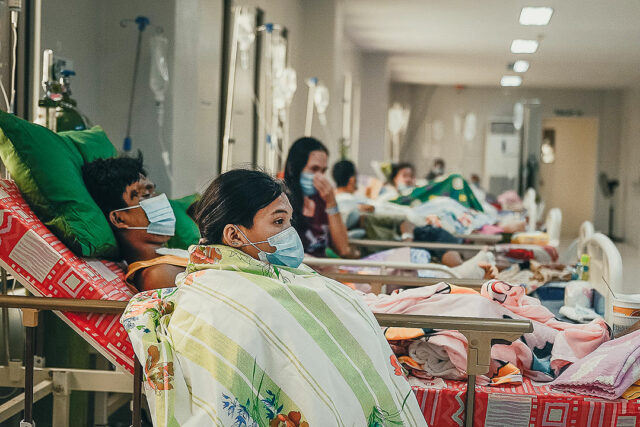
REPORTED deaths from storm Agaton, with international name Megi, has reached 172 while 110 were still missing, according to the national disaster management agency’s April 17 update.
Agaton brought several days of moderate but continuous rains mostly in the Visayas, the country’s central islands, and parts of southern Philippines, which triggered flooding and landslides that buried communities downhill.
Most of those who died were due to landslides in the province of Leyte in Eastern Visayas, with at least 110 in Baybay City and more than 50 in Abuyog town.
In Western Visayas, at least 11 people drowned in northern parts of Iloilo and in Capiz.
Search, rescue, and retrieval operations were continuing in the most devastated areas while relief services were also ongoing for 396,000 people displaced, with more than half staying across 909 evacuation centers.
President Rodrigo R. Duterte went to Leyte and Capiz on Friday and Saturday, respectively, where he promised survivors of continued food aid for “as long as necessary” and assistance for rebuilding homes or possible relocation.
“(T)he government is here, all the agencies of government is here. All your worries about food, that won’t be a problem at all. For as long as you are hungry and you don’t have any resources or haven’t been relocated, food will be provided. That won’t be a problem,” he said in Visayan in Baybay on Friday, based on a transcript emailed by the Presidential communications office.
Initial reports submitted to the national disaster council show 670 houses were totally destroyed while 9,723 were partially damaged.
AGRI DAMAGE
Meanwhile, farm sector damage has risen to P718 million, according to the Department of Agriculture’s continuing assessment of Agaton’s impact.
Damage and losses were reported in the regions of Western Visayas, Eastern Visayas, Zamboanga Peninsula, Soccsksargen and Caraga. There were 12,151 farmers affected, with volume of production loss at 41,580 metric tons (MT) and 17,925 hectares of agricultural areas.
Affected commodities include rice, corn, high value crops, and livestock.
Rice was the most affected crop with P672.2 million in losses across 17,318 hectares.
This was followed by high-value crops, such as banana and cacao, at P24.7 million or 576 MT and corn at P21.1 million or 883 MT.
The agriculture department said it is continuing to conduct the assessment of damage and losses in the agri-fisheries sector.
It also said it is providing assistance to affected farmers and fishers, including: rice, corn and assorted vegetable seeds, and drugs and biologics for livestock and poultry.
It is also using the Survival and Recovery Program of the Agricultural Credit Policy Council, available funds from Philippine Crop Insurance Corporation, and the Quick Response Fund for the rehabilitation of affected areas. — Marifi S. Jara and Luisa Maria Jacinta C. Jocson
Public schools can’t require vaccination vs COVID for student registration
UNVACCINATED learners should not be turned away by public schools as the country has started to partially shift back to in-person classes and registration is underway for the next school year, a local government official and senatorial aspirant said.
“There are reports that some schools require students to present proof of vaccination before they can be registered for in-person schooling,” said Sorsogon Governor Francis Joseph G. Escudero in a statement.
“This is, in plain terms, illegal,” said Mr. Escudero, who is eyeing a return to the Senate where he previously served for several terms beginning 2007.
“We cannot hinder access to education on any condition because this is a fundamental human right,” he added.
The Department of Education (DepEd) is holding an early registration period from March 25 to April 30 for the academic year 2022-2023.
Mr. Escudero emphasized that there is a law providing that all Filipinos receive quality education at all levels, with specific government agencies mandated to ensure access to education accessible for all.
“Even as we intensify our vaccination drive, in light of the millions of expiring COVID-19 vaccines, we cannot violate people’s rights and make vaccination mandatory,” he said.
“What the DepEd can strengthen is its education drive on why the youth should be vaccinated and the establishment of safety protocols in schools,” he added.
Vaccination against coronavirus disease 2019 (COVID-19) among children aged 12 to 17 began in Nov. 2021 while inoculation for those 5 to 11 was launched in February.
As of March, a combined 10.9 million have received the jab for the two age groups.
The Philippine government is targeting to vaccinate more than 39.41 million children aged zero to 17 years old against the coronavirus.
“Whether these children are vaccinated or not, they are entitled to enter our public and private schools, no ifs or buts. Their right to quality education is unconditional and unquestionable, and COVID-19 does not change that,” Mr. Escudero said. — Alyssa Nicole O. Tan
Life after presidency: Will the popular Duterte face prosecution over his drug war?
PRESIDENT Rodrigo R. Duterte could face prosecution over his controversial drug war among other issues after stepping down from office, analysts said, but several factors such as his continuing popularity and his successor would come into play as to whether he will ever be put behind bars.
Maria Ela L. Atienza, a political science professor at the University of the Philippines, told BusinessWorld in a text message that “given the weak party system in the Philippines, President Duterte will likely lose many allies once he steps down from office by end of June as politicians will gravitate to the new president.”
This is even more likely if Vice President Maria Leonor “Leni” G. Robredo, an opposition icon, leads the next administration, she added.
“A Robredo presidency may leave him without much options as there will be a strong demand from Robredo supporters for investigations related to the drug war, red-tagging of opposition, harassment of (the) opposition, pandemic response, graft and corruption, etc.,” Ms. Atienza said.
Mr. Duterte’s party, PDP-Laban, does not have an official presidential candidate as it has been divided into two warring factions. The President himself has declined to personally endorse any of the aspirants.
“It is quite unfortunate on his part and his allies that they failed to have a strong official candidate for president,” Ms. Atienza said. “He said he will not endorse any presidential candidate but we don’t know if he can make a deal with whoever becomes president so that he will be protected from legal challenges and investigations.”
University of the Philippines Political Science Assistant Professor Sol Dorotea R. Iglesias said the President’s transformation into citizen Duterte will put his popularity to the test.
“Is it genuine or are respondents motivated by fear or other reasons, as new research is beginning to show?” she told BusnessWorld in an email.
A Social Weather Stations survey released in February showed that Mr. Duterte’s satisfaction rating stayed “very good” as 75% of Filipinos remained satisfied with his performance.
“Compared to September 2021, gross satisfaction with President Duterte rose by eight points from 67%, gross undecided fell by two points from 11%, and gross dissatisfaction stayed at 15%,” it said in a statement.
A Robredo presidency could back domestic and international prosecution against Mr. Duterte since the vice president has long opposed the popular leader’s war on drugs and has made clear statements about allowing the International Criminal Court to conduct its investigation, Ms. Iglesias said.
“Prosecution of extra-judicial killings and other human rights violations during President Duterte’s term, particularly of activists and targets of red-tagging, can also be expected,” she said.
On the other hand, Froilan C. Calilung, a political science professor at the University of Santo Tomas, said in a Viber message to BusinessWorld that although cases were filed against former Philippine presidents after their respective terms, Mr. Duterte’s popularity is on an entirely “different level.”
It is “the first in recent history where an outgoing president enjoys a high satisfactory and trust rating,” Mr. Calilung said.
“This may mean that the public may not be interested in pursuing a case against him once he steps down,” he said. “Even if Leni wins, a Duterte imprisonment may be (a) far-fetched idea.”
Other presidential candidates, except for the late dictator’s son and namesake Ferdinand “Bongbong” R. Marcos, Jr., have expressed openness to an investigation of Mr. Duterte.
Ms. Atienza said the possibility of legal scrutiny will still depend on Mr. Duterte’s level of authority after leaving Malacañang Palace.
“A Marcos Jr. presidency may give him time to bargain for lesser legal battles and investigations but it depends on whether he will remain influential,” she said.
“Either way, his lawyers may use the usual route of appealing for leniency because of advanced age and illness.” — Alyssa Nicole O. Tan
Election watchdog warns voters not to confuse party-lists with gov’t programs
AN ELECTION Watchdog on Saturday warned the public of party-list groups bearing identical names with government programs.
In a statement on Saturday, Kontra Daya pointed out in its fact-checking initiative that Pagtibayin at Palaguin ang Pangkabuhayang Pilipino (4Ps) party-list group had a similar logo and acronym with the government’s conditional cash transfer program known as 4Ps.
“It is wrong for a party-list group to claim that the use of 4Ps acronym is similar to other party-list groups that use familiar acronyms like BHW (barangay health worker) and OFW (overseas Filipino worker),” it said.
The election watchdog noted that the general shape and texture of the party-list group’s logo are identical to an institutionalized poverty-reduction strategy of the government.
Kontra Daya rated as “false” the claim that the 4Ps party-list group’s acronym cannot be confused with the DSWD’s 4Ps program.”
The government’s 4Ps — or Pantawid Pamilyang Pilipino Program — was launched as a provisional poverty-reduction scheme in 2008.
It was institutionalized in 2019 with the passage of Republic Act No. 11310 or the Pantawid Pamilyang Pilipino Program Act.
Under the law, the government aims to provide adequate social services, provide full employment, and improve the quality of life of the marginalized sector.
The Department of Budget and Management earlier said the government will spend P115.7 billion for the social assistance program this year.
Kontra Daya said it was not surprising that the Department of Social Welfare and Development, the 4Ps implementing agency, has “denounced the use of the 4Ps acronym by the party-list group and has called for the cancellation of the latter’s Securities and Exchange Commission registration.”
Last month, the poll watchdog also conducted a study that said about seven out of 10 party-list groups in this year’s elections have been hijacked by big businesses and political clans.
These parties represented vague advocacies, are connected to the government or military, included incumbent local officials and had candidates who have been charged in court, it said. Under the Party-List System Act, elected officials from these groups must belong to “marginalized and underrepresented sectors.”
Party-list nominees account for a fifth of the House of Representatives.
Political analysts earlier called for the Comelec to review the party-list system.
“Domination by political dynasties of the partly-list system is another evidence of the rottenness of our political system,” said Michael Henry LI. Yusingco last month, a senior research fellow at the Ateneo de Manila University Policy Center.
“I understand that the Comelec is limited by the guidelines set forth by the party-list law and prevailing jurisprudence, but they cannot ignore the fact that the constitutional purpose of the party-list system is no longer being met,” he said. — John Victor D. Ordoñez
Economist flags possibility of close vote, electoral protest
THE PROSPECT of a closer Presidential vote is looming based on momentum indicated by the March surveys, raising the possibility of a contested outcome that could lead to a repeat of the 2016 electoral protest, a GlobalSource Partners economist said.
Romeo L. Bernardo, the firm’s Philippine country analyst, said in a brief that Ferdinand R. Marcos Jr.’s lead in the polls remains significant, though Vice President Ma. Leonor G. Robredo’s following has swollen to about 24%.
“While March survey results in past elections tended to have good predictive value of election results, many acknowledge that the campaign momentum is on VP Robredo’s side. Will this time be different?” Mr. Bernardo said.
“With less than a month to go until election day, does she have enough time to catch up? And if she manages to significantly narrow the gap towards the homestretch, would a close count lead to a repeat of the 2016 electoral protest (between the same two candidates but for the VP position) and increase business uncertainty?” he added.
He added that the Pulse Asia survey from mid-March showed Ms. Robredo’s voter share jumping 9 percentage points to 24%, which has “invigorated her supporters to intensify their house-to-house push in hopes of winning over supporters of the other candidates.”
“Although the VP’s recent gains have made the presidential campaign more interesting, political pundits continue to eye the wide gap between her and Mr. Marcos. The survey in March showed Mr. Marcos still enjoying a majority of voter support (56%), which is just 4 (percentage points) below his share in February.”
He also noted the prospect of an economy returning to normal, as reflected in the World Bank and Asian Development Bank (ADB) economic outlooks for the Philippines that were “mostly steady.”
The World Bank sees Philippine gross domestic product (GDP) in 2022 coming in at 5.7%, down from the 5.8% forecast issued in October. The ADB’s forecast was 6%, unchanged from its view in December.
“The steady outlooks (reflected) the positive impact of increased economic activity following the lifting of Covid restrictions, against the negative impacts of slower global growth and tighter financial conditions as well as rising inflation,” Mr. Bernardo said.
“Nevertheless, both institutions warned of downside risks from a worsening of global conditions, economic and geopolitical, in the face of more limited macroeconomic policy room,” he added. — Tobias Jared Tomas
Globe says willing to help in revising SIM card bill
GLOBE TELECOM, Inc. said it is ready to help legislators review the proposed SIM Card Registration Act, which President Rodrigo R. Duterte vetoed.
“Given this development, we stand ready to provide advice as they examine the matter deeper,” General Legal Counsel Froilan Vicente M. Castelo said in a statement late Saturday in response to a BusinessWorld query.
“Globe reiterates its commitment to support the government in its fight against fraud, terrorism and other crimes through the enforcement of existing laws,” he added.
The Palace announced Friday that Mr. Duterte had vetoed the proposed measure, which seeks the mandatory registration of subscriber identity module (SIM) cards. The President said such a measure could result in “dangerous state intrusion and surveillance, threatening many constitutionally protected rights,” because it also calls for the registration of social media accounts.
“Globe is following with interest progress on the SIM Card Registration Act,” Mr. Castelo said.
The proposed measure sets penalties for anyone who registers a SIM card using false information.
Mr. Duterte is “pushing instead for a more thorough study of the proposal,” Mr. Castelo noted. “We respect his decision.”
“Globe reiterates its commitment to support the government in its fight against fraud, terrorism and other crimes through the enforcement of existing laws,” he added.
The leading mobile operators, Globe and PLDT, Inc.’s Smart Communications, Inc., both supported the proposed measure.
Globe has called for the “rational enforcement” of the SIM Card Registration Act once it becomes law.
It would “protect Filipinos from rampant fraudulent activities using mobile phones and the internet,” the company said in a statement in February.
PLDT and Smart said that the measure would also help “spur e-commerce adoption and growth.”
“The PCTO (Philippine Chamber of Telecom Operators) supports the SIM card registration bill but this should ensure safeguards that will not unduly displace prepaid subscribers by giving a sufficient SIM registration period and ensuring that the wide adoption or use of the national ID is already in place,” said Roy Cecil D. Ibay, Smart Communications vice president for regulatory affairs.
Democracy.Net.PH, an information and communications technology rights group, welcomed Mr. Duterte’s veto.
“We were this close to allowing an intrusion into our privacy for what was nothing more than security theater,” the group said in a statement.
“The President vetoed it not only because the constitutional defects were glaring, but because the passage of this law posed a real and serious threat to our national security,” it added.
The group also said that more than 83,000 individuals signed its petition on the Change website calling for the veto of the bill.
Senator Grace S. Poe-Llamanzares, who chairs the Senate committee on public services, expects Congress to “act in a timely manner in reconsidering the bill for approval in accordance with the legislative process.”
“Each day without the safeguards from the measure makes our people vulnerable to ripoffs that take away their money and cause them anxiety; the onslaught of cybercrimes and fake news that tear away the fabric of our democracy,” she said in a statement.
Senate Minority Leader Franklin M. Drilon said: “By vetoing this bill, the President lets trolls thrive, spread lies and hate, and fuel discord and division.”
“Political trolling as we’ve seen these days is a thriving business. This veto is a big win for troll farms.”
“To say that I am disappointed by the President’s veto is an understatement. I authored this particular provision of the measure in order to address the anonymity in the internet and the social media that allowed an environment for troll accounts and fake news,” he added.
Hastings Holdings, Inc., a unit of PLDT Beneficial Trust Fund subsidiary MediaQuest Holdings, Inc., has a majority stake in BusinessWorld through the Philippine Star Group, which it controls. — Arjay L. Balinbin
Foreign borrowing still seen as ‘prudent’ despite major expansion in gov’t debt
GOVERNMENT borrowing remains “prudent” despite the significant increase in the public debt, a bank economist said, adding that much of the borrowing taken on in the last two years was necessary to help manage the coronavirus disease 2019 (COVID-19) pandemic.
Rizal Commercial Banking Corp. Chief Economist Michael L. Ricafort said the government needed to insulate the economy from external risks.
The Department of Finance (DoF) said in an economic bulletin Saturday that the recovery that emerged in 2021 was helped along by the loans and grants taken on since the start of the pandemic.
It said the long-term nature of much of the debt — up to 40 years — will still require a fiscal consolidation program and improved collections.
“Both the government and private sector have been prudent on foreign borrowing, in view of foreign exchange risks entailed, learning from the past crisis periods, especially during the Asian financial crisis,” Mr. Ricafort said.
“The country’s external debt-to-GDP ratio still relatively low compared to other ASEAN and similarly rated countries,” Mr. Ricafort added. “Most of the country’s foreign debt is medium- to long-term in nature to prevent the risk of bunching debt maturities.”
The Russian invasion of Ukraine, which began on Feb. 24, has added to the risk faced by all economies by pushing up fuel and commodity prices, while the winding down of the US Federal Reserve’s bond-buying program is expected to signal higher interest rates, he said.
The BSP has so far lent P300 billion to the national government, while issues of Retail Treasury Bonds (RTBs), have also reduced the need for the government to borrow overseas.
Mr. Ricafort said one of the areas of focus when taking on added debt is managing foreign exchange risk, particularly with regard to foreign debt.
The peso closed at P52.03 on Wednesday in a shortened trading week due to the Easter holidays, against Tuesday’s close of P52.10. The Wednesday close was among the currency’s weakest in two years.
Loans raised as of Jan. 14 for the pandemic response totaled P1.31 trillion, with the Asian Development Bank (ADB) providing P303.37 billion and the World Bank Group’s International Bank for Reconstruction and Development (IBRD) accounting for P291.95-billion, according to DoF data.
Donations were also received from the Asian Infrastructure Investment Bank (AIIB) (P66.01 billion), the Japan International Cooperation Agency (JICA) (P47.56 billion), Agence Française de Développement (AFD) (P28.96 billion), and the Eximbank of Korea (KEXIM) (P10.15 billion).
Meanwhile, grants received amounted to P2.74 trillion, with World Bank and European Union accounting for P1.06 trillion.
In total, combined grants and loans totaled P4.05 trillion.
The government plans to collect P3.29 trillion from tax and non-tax revenues in 2022, according to the Department of Budget and Management (DBM). The Bureau of Internal Revenue plans to collect P2.4 trillion in 2022, while the Bureau of Customs plans to collect P671 billion.
Gross domestic product (GDP) growth was 5.7% in 2021, revised upward from the 5.6% reported on Jan. 27, and above the government’s 5-5.5% target. The 2021 GDP represents a rebound from the 9.6% contraction in 2020.
Meanwhile, growth for the fourth quarter was 7.8%, against the 8.2% contraction in the year-earlier period.
The Philippines has received 76.44 million vaccines from the COVID-19 Vaccines Global Access (COVAX) and from bilateral donations, the DoF said, citing data from the UNICEF COVID-19 Market Dashboard.
Nearly 85% of donated vaccines or 65.33 million doses came from COVAX.
At the end of 2021, 63% of the target population was vaccinated, with 48.6 million people receiving full doses. As of April 11, this number had grown to 66.74 million, while 12.53 million individuals have received booster shots.
National government debt hit a record P12.09 trillion at the end of February. In 2021, the debt-to-GDP ratio hit a 16-year high of 60.5%. This is higher than the 60% threshold considered manageable by multilateral lenders for developing economies. — Tobias Jared Tomas
New management rules issued for marine protected areas
THREE departments signed on to a joint memorandum circular outlining new rules for managing marine protected area networks (MPANs), restore damaged coastal ecosystems, and preserve marine habitats, including coral reefs.
The Departments of Environment and Natural Resources (DENR), Agriculture (DA), and Interior and Local Government (DILG) is seen as a win for efforts to maintain biodiversity, according to SMARTSeas, a United Nations Development Programme (UNDP)-supported project.
“The eventual approval of the joint policy guidelines on the establishment and management of MPANs will be valuable in biodiversity conservation efforts,” SMARTSeas National Project Manager Vincent V. Hilomen said in a statement.
The memorandum circular places biodiversity conservation on equal footing with economic development.
“There will be a value for a government policy that places conservation as equally important to development and progress. Many of the degraded coastal and marine habitats resulted from the relentless push for development and progress with little afterthought of the higher costs to the environment,” Mr. Hilomen said.
MPAN is a collection of individual MPAs or reserves operating cooperatively under the Strengthening Marine Protected Areas to Conserve Marine Key Biodiversity Areas (SMARTSeas) project.
The protection regime for coastal ecosystems classified as MPAs includes patrolling, surveillance of habitats, and repair of signage, other facilities, and equipment.
“One of the greatest challenges that we are experiencing in establishing MPANs is still the acceptance of the community. There are several instances where the communities resist to set aside a portion of their waters for protection purposes because they think that access to their fishing areas will be limited,” Mr. Hilomen added. — Luisa Maria Jacinta C. Jocson






